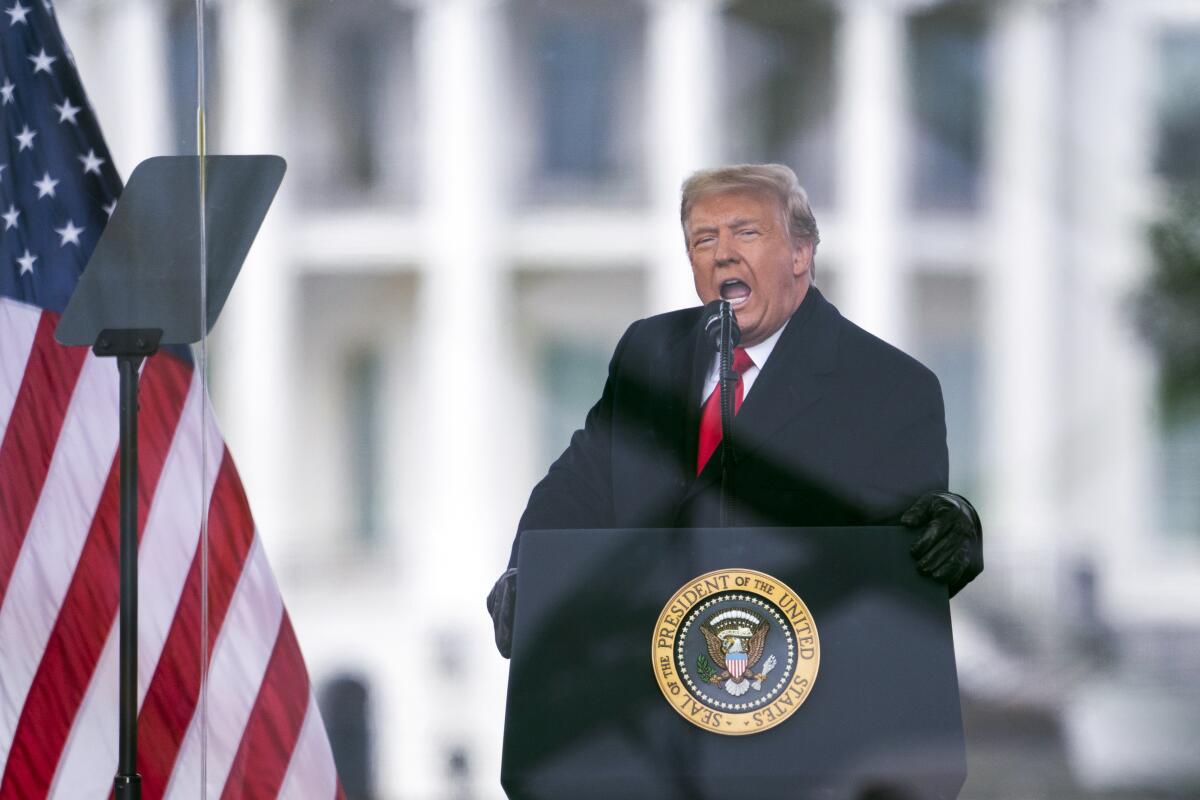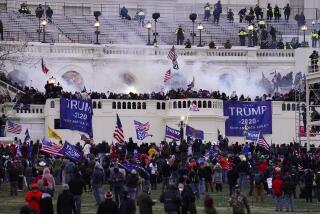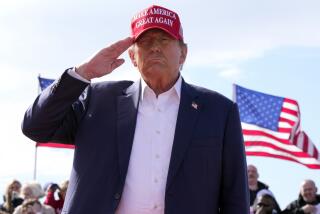House panel’s possible options for alleging Trump Jan. 6 crimes

- Share via
WASHINGTON — The Senate acquitted former President Trump last year of inciting the Capitol insurrection. But neither Trump nor any of his top advisors have faced charges over the attack in a court of law, and it’s uncertain if they ever will.
But increasingly, lawmakers on the House committee investigating the Jan. 6 assault are pressing Atty. Gen. Merrick Garland to investigate Trump and his associates. They’ve been laying out possible crimes in at least one court filing and openly discussing others, all related to that day’s violent attack by Trump supporters looking to disrupt Congress’ formal certification of his reelection defeat.
Here’s a look at some of the suggested crimes floated by the House panel:
Criminal conspiracy to defraud the United States
After floating possible crimes for several months, lawmakers on the panel put it on paper for the first time in a March court filing. The filing was in response to a lawsuit from John Eastman, a lawyer and law professor who was consulting with Trump while attempting to overturn the election and who tried to withhold documents from the committee.
The committee argued that it has evidence supporting the idea that Trump, Eastman and other allies of the former president “entered into an agreement to defraud the United States.” The panel says Trump and his allies interfered with the election certification process, disseminated misinformation about election fraud and pressured state and federal officials to assist in that effort.
Obstruction of an official proceeding
U.S. District Court Judge David O. Carter appeared somewhat swayed by the panel’s arguments. In ordering Eastman to turn over the materials, Carter wrote in an order published this week that the court “finds it more likely than not that President Trump corruptly attempted to obstruct the Joint Session of Congress on January 6, 2021.”
In the filing, the panel argued that Trump either attempted or succeeded at obstructing, influencing or impeding the ceremonial process on Jan. 6 and “did so corruptly” by pressuring Vice President Mike Pence to overturn the results as he presided over the session. Pence declined to do so.
“President Trump and members of his campaign knew he had not won enough legitimate state electoral votes to be declared the winner of the 2020 Presidential election during the January 6 Joint Session of Congress, but the President nevertheless sought to use the Vice President to manipulate the results in his favor,” the committee wrote.
Common law fraud
The committee has also floated a charge of “common law fraud,” or falsely representing facts with the knowledge that they are false. Trump embarked on a wide-scale campaign to convince the public and federal judges that the 2020 election was fraudulent and that he, not Biden, won the electoral college tally.
Election officials and courts across the country, along with Trump’s attorney general, rejected those claims.
As an example of such fraud, the committee noted in the Eastman filing that a Justice Department official told Trump directly that a Facebook video posted by his campaign “purporting to show Georgia officials pulling suitcases of ballots from under a table” was false, yet the campaign continued to run it. Georgia officials also repeatedly denied the claim.
“The president continued to rely on this allegation in his efforts to overturn the results of the election,” the committee said.
Dereliction of duty
Though they didn’t lay it out in the Eastman filing, leaders of the House panel suggested earlier this year that they believe Trump could also be liable for “dereliction of duty,” or inaction as his supporters violently broke the windows and doors of the U.S. Capitol.
Rep. Bennie Thompson (D-Miss.), the committee chairman, said in January that “the harm that I see is the president of the United States seeing the Capitol of the United States under siege by people he sent to the Capitol and did nothing during that time.”
The committee’s vice chairwoman, Rep. Liz Cheney (R-Wyo.), noted that same month that the panel knows from “firsthand testimony” that Trump watched the attack happen on television.
“We know that he did not walk the very few steps to the White House briefing room, get on camera immediately, and tell the people to stop and go home,” she said.
Cheney said it was hard to “imagine a more significant and more serious dereliction of duty” than Trump’s failure to quell the insurrection.
Financial crimes
While the committee hasn’t floated specifics, it has created an internal task force to investigate financing for the massive rally on the National Mall the morning of Jan. 6 and any donors who might have backed transportation or other costs that could have helped foster the violence.
Asked earlier this year on CNN if they have any evidence of financial fraud, Thompson said members of the committee “have some concerns, but we have not made those concerns public at this point.”
“We do think it’s highly concerning on our part that people raised monies for one activity, and we can’t find the money being spent for that particular activity,” Thompson said. “So, we will continue to look at it. And the financing is one of those things that we will continue to look at very closely.”
Uncertainty ahead
More than 775 rioters have been arrested on suspicion of crimes related to the insurrection. Yet legal consequences have been elusive for Trump and the other top officials who told lies about election fraud and laid the groundwork for their actions.
Congress has no authority to prosecute, but can send so-called criminal referrals to the Justice Department. Garland can then decide whether to act. Justice Department action would be far from guaranteed. And it’s uncertain whether any charges against the president would hold up in court. It could be difficult for prosecutors to craft a winning case against Trump.
The president urged on his massive crowd of supporters that morning and returned to the White House and watched some of them break into the Capitol on TV. The rioters beat police, sent lawmakers running and interrupted the certification of Biden’s victory.
More to Read
Get the L.A. Times Politics newsletter
Deeply reported insights into legislation, politics and policy from Sacramento, Washington and beyond. In your inbox three times per week.
You may occasionally receive promotional content from the Los Angeles Times.










